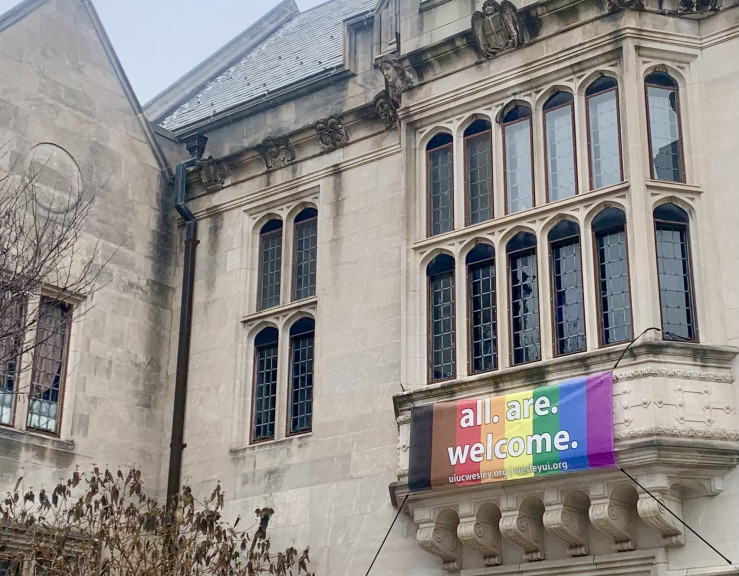U of I law professor cited on U.S. Senate floor in passing Respect for Marriage Act

Wesley United Methodist Church at the University of Illinois at Urbana-Champaign displays a banner Jan. 30 with the rainbow flag, widely recognized as a symbol of support for the LGBT community. Piper Pascarella
CHAMPAIGN - A University of Illinois College of Law professor was cited on the United States Senate floor on Nov. 29 during a debate on whether to pass the groundbreaking Respect for Marriage Act into public law.
Professor Robin Fretwell Wilson, the Mildred Van Voorhis Jones Chair in Law and director of the Institute of Government and Public Affairs in the U of I system, co-authored a letter to Sens. Tammy Baldwin and Susan Collins urging bipartisan support.
“This is maybe the single most significant piece of LGBT protection in federal law in at least a decade and a half,” Wilson said.
Wilson wrote the letter along with professor Douglass Laycock of the University of Virginia, professor Thomas Berg of the University of St. Thomas and professor Carl Esbeck of the University of Missouri.
“The religious-liberty protections in RMA are meaningful and important even if not comprehensive,” the scholars said in their letter.
The Respect for Marriage Act requires the federal government to acknowledge married couples if the marriage was valid under the state laws where it was performed.
This means that married couples, including same-sex and interracial couples, must be federally recognized no matter the marriage laws of the state they are in, Wilson said.
Cited multiple times on the Senate floor, their letter said that beliefs regarding marriage, including the idea that marriage is exclusive to a male and female in certain faith traditions, are due proper respect and would be protected under the clauses of the act.
“RMA poses little or no new risk to religious liberty beyond those that already exist from nondiscrimination laws combined with same-sex marriage rights under Obergefell v. Hodges. Those rules are currently in force, without RMA,” the letter states.
Obergefell v. Hodges ruled that the fundamental right to marry is guaranteed to same-sex couples underneath the Due Process Clause and Equal Protection Clause of the 14th amendment of the U.S. Constitution, requiring states to license and recognize same-sex marriage.
The act continues to uphold religious liberties and protections under the federal government, specifically the Religious Freedom Restoration Act, which ensures interests in religious freedom are protected.
According to the RMA, non-profit religious organizations are not required to provide service, goods, or acknowledgment toward marriages they do not recognize. More than 40 religious groups supported the act.
“The RMA says that if, for whatever reason, the Supreme Court decides to roll back their decision in Obergefell v. Hodges, their marriage is still recognized by the federal government,” Wilson said.
Wilson’s letter contributed to a 61-36 Senate vote in support of passing the act, which was supported by 49 Democrats and 12 Republicans.
Signed into law by President Joe Biden on Dec. 13, the act repealed the previous Defense of Marriage Act.
That older act had been signed by President Bill Clinton on Sep. 21, 1996. It declared that same-sex marriages would not be recognized by the federal government, regardless of state laws.
The passing of the Respect for Marriage Act ensures thousands of federal benefits tied to marriage will continue to be available to same-sex and interracial couples while permitting religious groups to decide for themselves what counts as marriage without federal law encroachment, Wilson said.
“Congress rarely does this,” Wilson said. “They’re not so great at finding ways where people with fundamental disagreements on what it means to live a good life can find some common ground.
“I think it’s personally inspiring...if they can do it for this, they can do it for other issues as well, and they should.”

